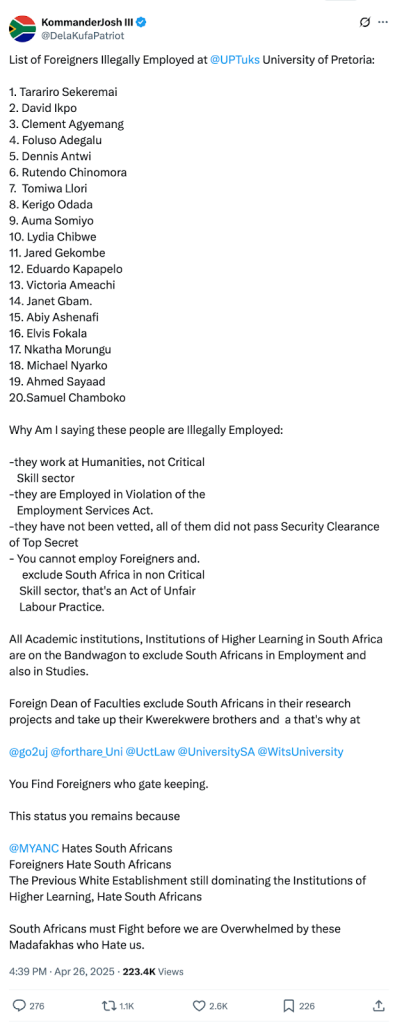Centre for Analytics and Behavioural Change
Over the years, the South African online anti-immigrant narrative has drawn on several topics and issues to substantiate calls for immigrants to return to their home countries.
Among these are that immigrants were responsible for crime, unemployment, and the depletion of public services, including hospitals, schools, and prisons.
The conversation around the employment ratios of South Africans to immigrants in various businesses and sectors continues to thrive online, this year targeting South African universities, which are deemed the sites of ‘unpatriotic’ employment practices according to proponents of the anti-immigrant narrative.
The narrative that South African universities were prioritising the employment of immigrants over South Africans became popular around March this year. Among those pioneering this narrative and receiving high engagement for ‘exposing’ this issue is the @DelaKufaPatriot account on X.
The account has been creating and amplifying posts that several South African universities, including the University of Johannesburg, University of Pretoria, Sefako Makgatho Health Sciences University, Wits University and Fort Hare University, are prioritising the employment of immigrants over South Africans.
Similar claims were made by the @PSAFLive account, which describes itself as an “independent online news and current affairs channel” on X.
@DelaKufaPatriot was created in February 2024 and defines itself as ‘Operation-Dudula is Government Of The Day’. It has more than 2,000 followers.
DelaKufaPatriot has more than 15,000 mentions within the online anti-immigrant conversation between 1 January 2025 and 4 May 2025. The account’s posts enjoy thousands of likes and high engagement.


Example posts from the @DelaKufaPatriot account
Among the claims made by the account are that immigrants were:
- ‘Dominating’ appointments at South African universities;
- Using fraudulent IDs and were not vetted by the universities; and
- Illegally bringing their friends and family to South Africa.
Interestingly, the account mentions the employment of academics from other African countries, e.g. Zimbabweans, Nigerians, Ethiopians and Malawians, but not those from European countries.
The account also shared statistics on the number of university employees and their alleged names. These posts garnered hundreds of reposts and likes, however, the authenticity of the names shared by the account is unknown.



Example posts from the @DelaKufaPatriot account
The DelaKufaPatriot account claims that the individuals are in the country and illegally employed because: “They work at Humanities, not [a] critical skill sector; they are employed in violation of the Employment Services Act; they have not been vetted, all of them did not pass security clearance of top secret; and you cannot employ foreigners and exclude South Africa in non-critical skill sector, that’s an Act of unfair labour practice”.
Apart from this list, there is no other evidence for its claims, a common tactic used in misinformation narratives where purveyors invent and/or exaggerate information to trigger an emotional response to increase the likelihood that people will share without considering the reliability of the information. They appeal to existing anti-immigration online narratives.
The account, which hides behind anonymity, shared the alleged names of the individuals on social media.
This could be considered doxxing, where a person’s personal information is shared without their consent. This poses a threat to the individual (assuming they exist) in South Africa’s volatile anti-immigrant climate.
In response to the allegation made by the account, Fort Hare University issued a statement condemning the allegations as untrue and incendiary, further stating that 81% of its staff were South African.
According to media reports, Central University of Technology and the University of the Free State have also rejected allegations that they were prioritising immigrants over locals.
As the government reportedly calls on universities and colleges to update their data on foreign staff, it is also worth looking into how the online conversation is progressing, and whether the cases presented are manipulated to support xenophobic sentiments.
End

 by
by